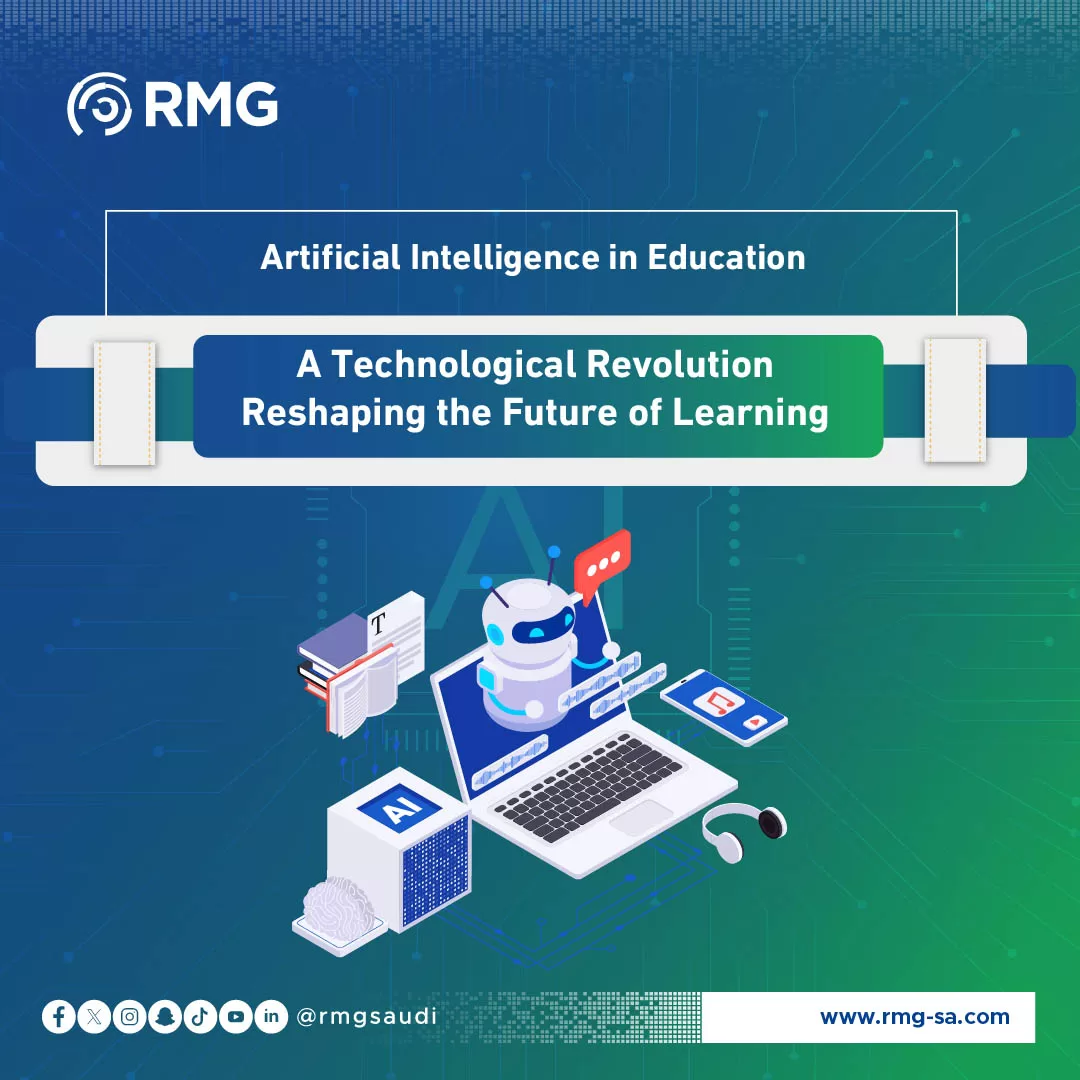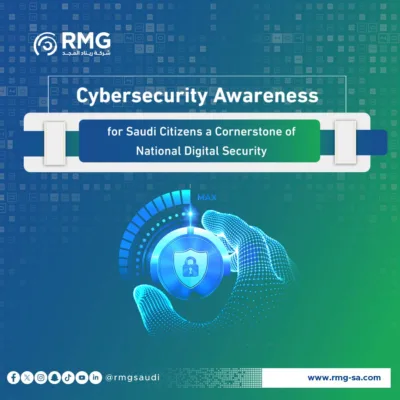Blog Body
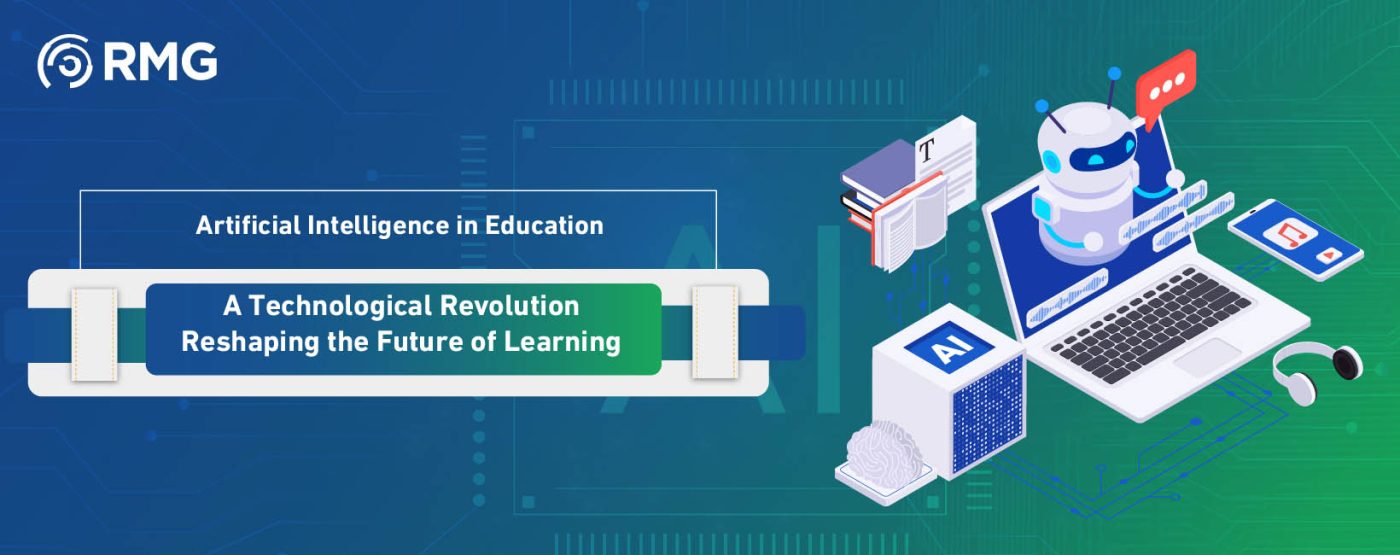
The world in the 21st century is witnessing radical transformations in various fields thanks to rapid technological advances, and education is one of the most prominent of these fields that is experiencing remarkable development. In light of these changes, artificial intelligence (AI) stands out as one of the most important technologies that is revolutionizing the methods of education and learning. Artificial intelligence is defined as the ability of machines to simulate human intelligence by analyzing data, learning from experiences, and making decisions. By integrating this technology into education, the educational experience can be improved in an unprecedented way, content can be customized to suit the needs of each student, and innovative tools can be provided for teachers and students alike.
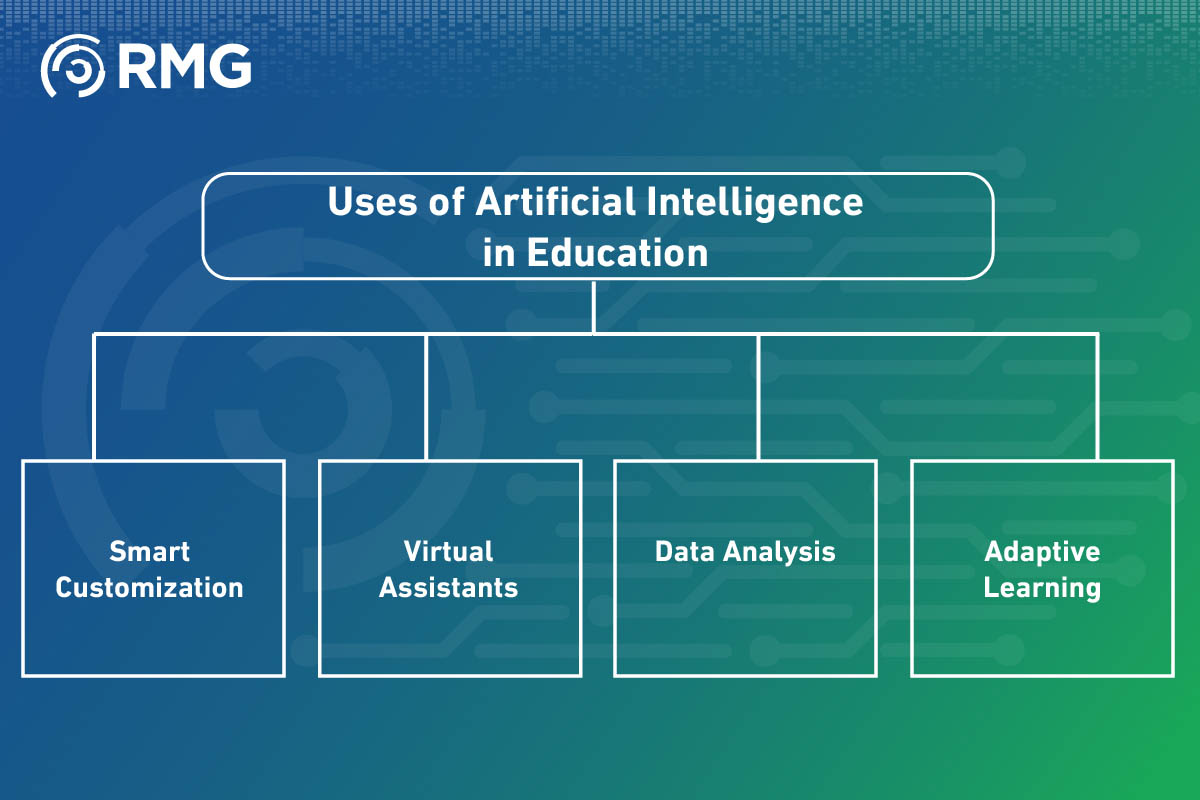
Uses of Artificial Intelligence in Education
- Smart Customization
Smart customization is considered one of the most prominent uses of artificial intelligence in education. By analyzing the massive amounts of data (Big Data) related to students, artificial intelligence can identify the strengths and weaknesses of each student and provide educational content that is tailored to their individual needs. For example, if a student is having difficulty understanding a specific concept in mathematics, the AI system can provide an additional explanation or practice exercises that focus on this concept. This approach not only improves academic results but also increases students’ motivation to learn.
- Virtual Assistants
Artificial intelligence technologies are used to develop virtual assistants that can help students get quick and accurate answers to their inquiries. These assistants, such as “chatbots,” operate around the clock and provide students with immediate support in understanding the study materials. For example, a student can ask a virtual assistant about the interpretation of a complex chemical equation and receive a detailed answer in seconds.
- Data Analysis
Artificial intelligence can analyze student performance in detail and identify areas where they need improvement. By collecting data from tests, assignments, and classroom interactions, intelligent systems can provide detailed reports to teachers, enabling them to direct their efforts more effectively. For example, if the system notices that a group of students is having difficulty with a particular topic, it can alert the teacher to repeat the explanation or provide additional resources.
- Adaptive Learning
Adaptive learning is an educational system that dynamically adapts to the level of each student. Using artificial intelligence algorithms, these systems can modify educational content based on the student’s progress. If the student demonstrates a quick understanding of a particular topic, the system can provide more advanced materials. Conversely, if the student encounters difficulty, the system can provide additional explanation or practice exercises. This approach ensures a more effective and personalized learning experience.
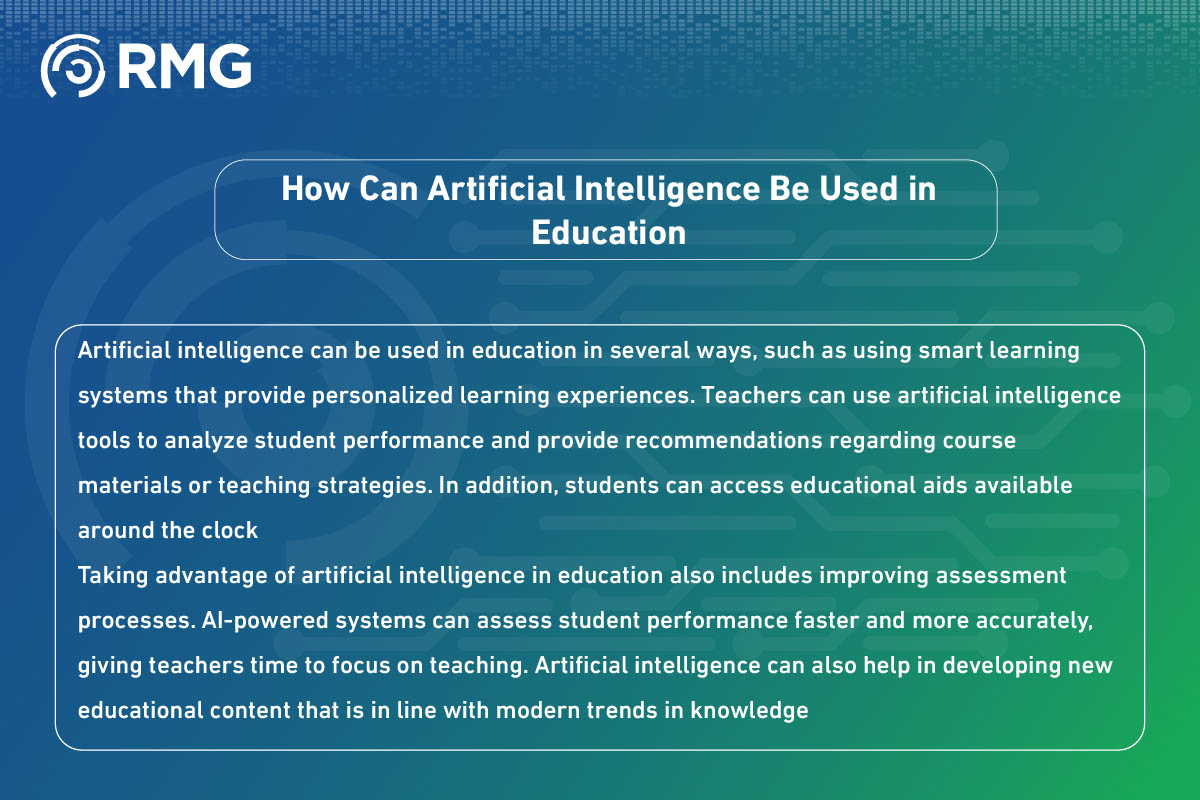
How Can Artificial Intelligence Be Used in Education?
Artificial intelligence can be used in education in several ways, such as using smart learning systems that provide personalized learning experiences. Teachers can use artificial intelligence tools to analyze student performance and provide recommendations regarding course materials or teaching strategies. In addition, students can access educational aids available around the clock.
Taking advantage of artificial intelligence in education also includes improving assessment processes. AI-powered systems can assess student performance faster and more accurately, giving teachers time to focus on teaching. Artificial intelligence can also help in developing new educational content that is in line with modern trends in knowledge.
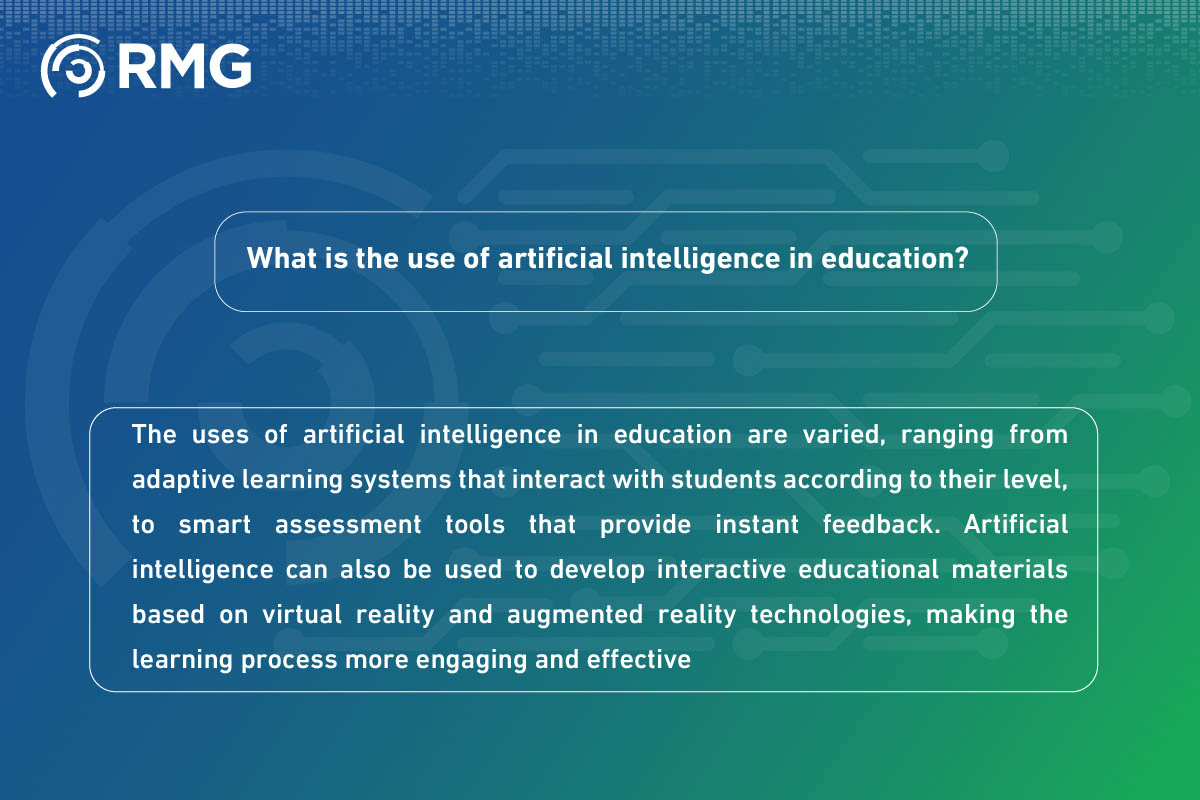
What is the use of artificial intelligence in education?
The uses of artificial intelligence in education are varied, ranging from adaptive learning systems that interact with students according to their level, to smart assessment tools that provide instant feedback. Artificial intelligence can also be used to develop interactive educational materials based on virtual reality and augmented reality technologies, making the learning process more engaging and effective.
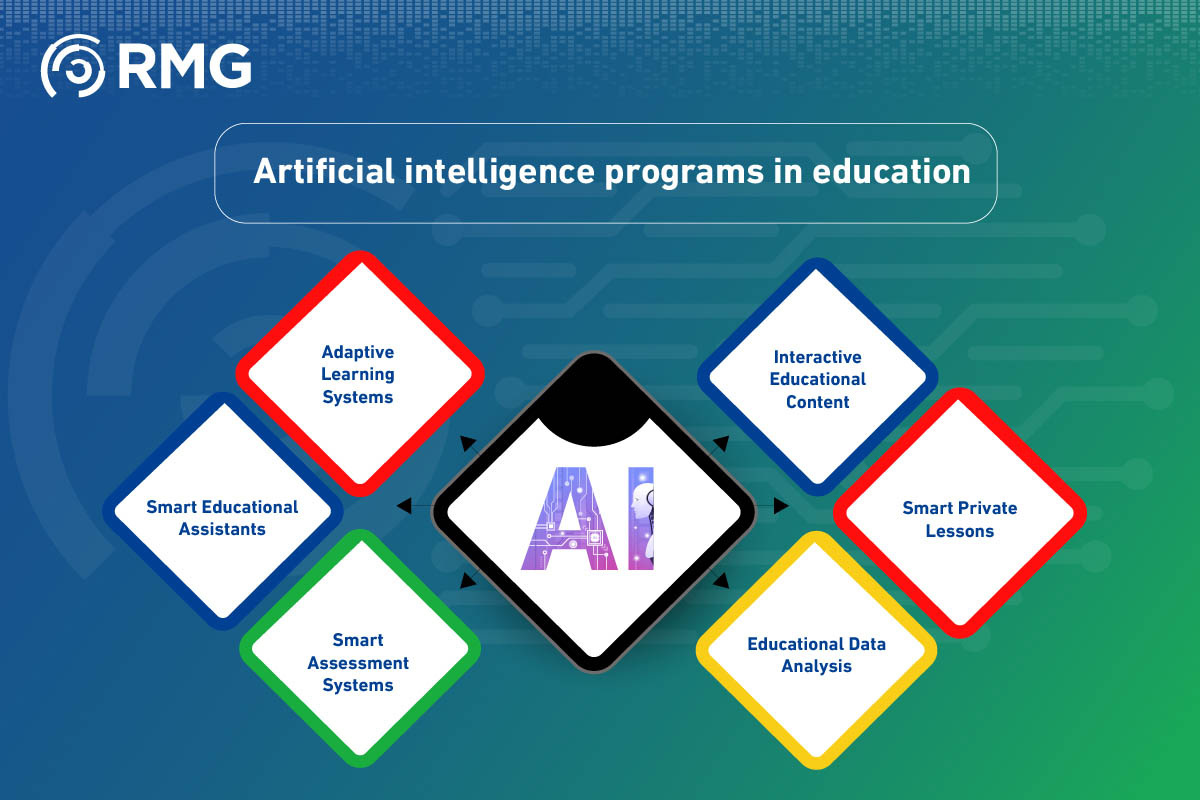
Artificial intelligence programs in education
There are many artificial intelligence programs used in education, which contribute to improving the learning experience and facilitating the teaching process. Here are some of the most prominent programs:
- Adaptive Learning Systems:
- These systems use artificial intelligence techniques to customize educational content based on the student’s level and needs. Such as:
- Knewton: A platform that offers customized course materials and continuously adapts the content based on the student’s progress.
- These systems use artificial intelligence techniques to customize educational content based on the student’s level and needs. Such as:
- Smart Educational Assistants:
- These tools include programs such as:
- Socratic: An application that uses artificial intelligence to help students solve problems and assignments by photographing or writing.
- These tools include programs such as:
- Smart Assessment Systems:
- These systems help in assessing student performance accurately and quickly. Such as:
- Gradescope: A platform that uses artificial intelligence to automatically assess assignments and tests.
- These systems help in assessing student performance accurately and quickly. Such as:
- Interactive Educational Content:
- Technologies such as virtual reality and augmented reality are used to create immersive learning experiences. Such as:
- Engage: A platform that provides interactive learning environments using virtual reality technologies.
- Technologies such as virtual reality and augmented reality are used to create immersive learning experiences. Such as:
- Smart Private Lessons:
- Programs like:
- Duolingo: Uses artificial intelligence to provide personalized language lessons based on the student’s level and progress.
- Programs like:
- Educational Data Analysis:
- These systems are used to analyze student performance data and extract valuable insights. Such as:
- Civitas Learning: A platform that uses data to improve student outcomes in educational institutions.
- These systems are used to analyze student performance data and extract valuable insights. Such as:
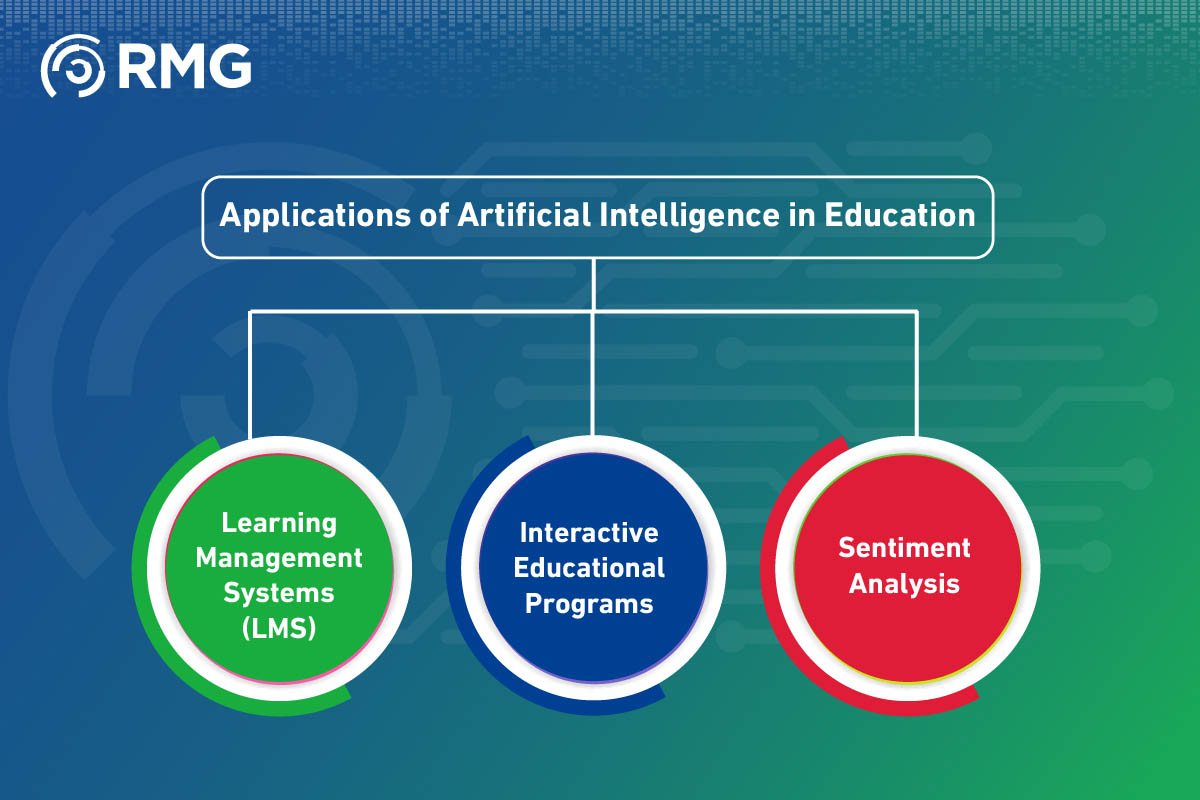
Applications of Artificial Intelligence in Education
- Learning Management Systems (LMS)
Learning Management Systems supported by artificial intelligence are used to analyze student behavior and provide personalized learning recommendations. These systems can track student progress, identify materials that need review, and provide suggestions for additional educational activities.
- Interactive Educational Programs
Interactive educational programs include tools such as educational games and simulations that use artificial intelligence techniques to make learning more interactive and engaging. For example, students can use a virtual simulation to conduct complex scientific experiments in a safe and controlled environment.
- Sentiment Analysis
Artificial intelligence can analyze students’ emotions by monitoring facial expressions and tone of voice while interacting with educational materials. This information can help teachers understand the psychological state of students and provide the necessary support.
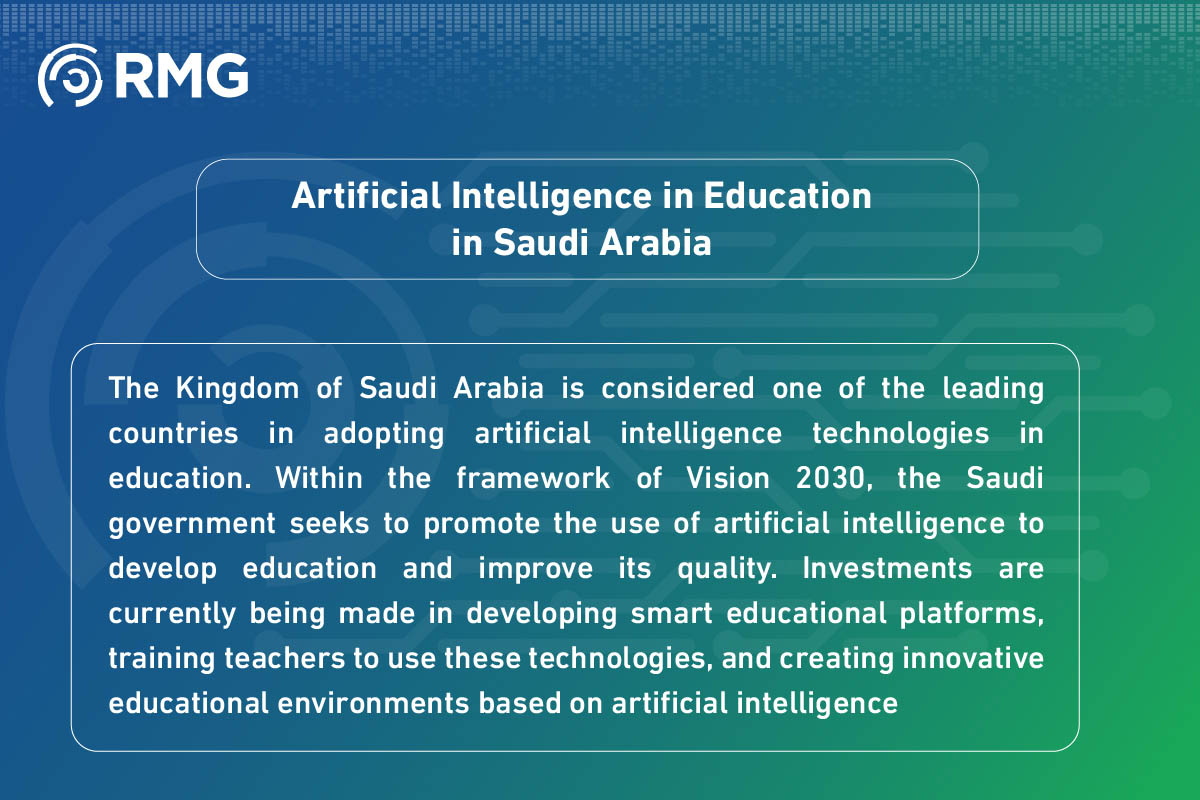
Artificial Intelligence in Education in Saudi Arabia
The Kingdom of Saudi Arabia is considered one of the leading countries in adopting artificial intelligence technologies in education. Within the framework of Vision 2030, the Saudi government seeks to promote the use of artificial intelligence to develop education and improve its quality. Investments are currently being made in developing smart educational platforms, training teachers to use these technologies, and creating innovative educational environments based on artificial intelligence.
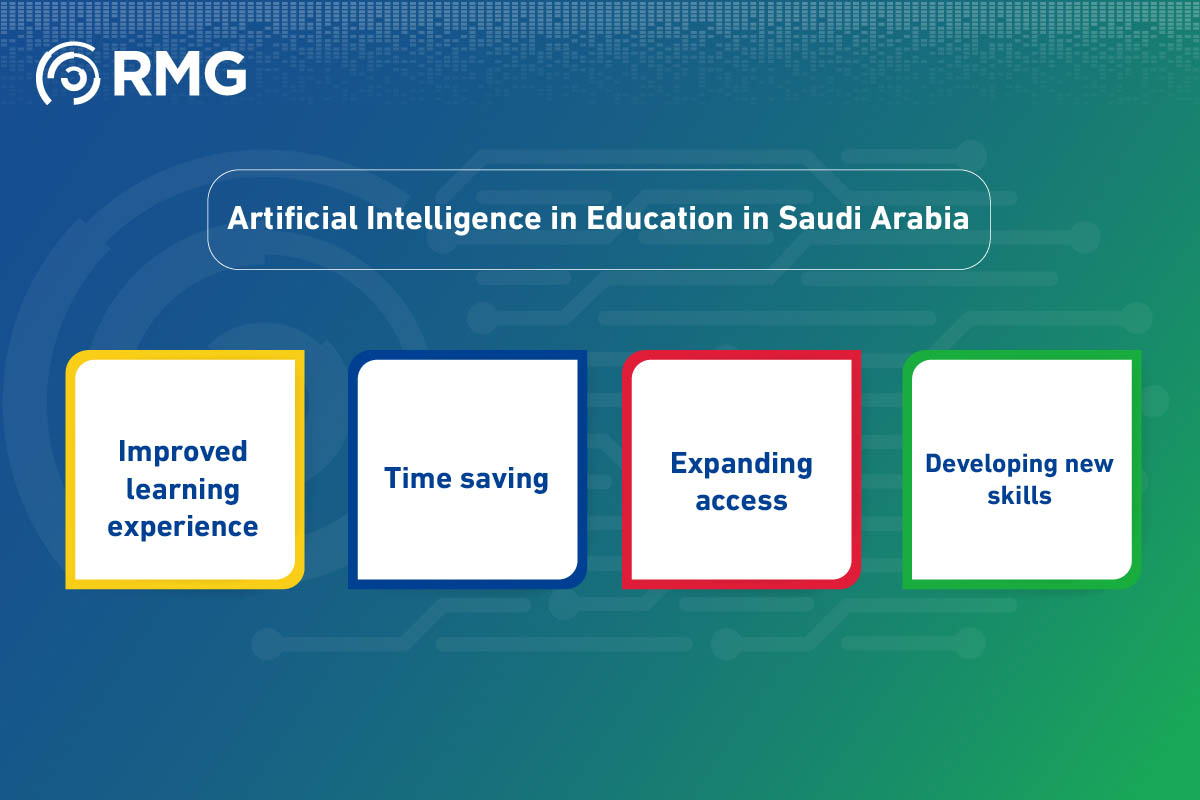
Advantages of Artificial Intelligence in Education
- Improved learning experience: By customizing educational content, students’ interaction and interest in study materials are increased.
- Time saving: Automating routine tasks such as grading assignments allows teachers to focus on the creative aspects of education.
- Expanding access: Artificial intelligence can make education available to students in remote areas or those who face difficulties in accessing traditional education.
- Developing new skills: Helps students acquire skills such as critical thinking and problem-solving, which reflect the requirements of the modern labor market.
Disadvantages of Artificial Intelligence in Education
- Impact on the role of teachers: Over-reliance on artificial intelligence may reduce the traditional role of teachers.
- Privacy concerns: Collecting students’ personal data raises questions about the security and privacy of this information.
- Implementation cost: The costs of developing and implementing artificial intelligence technologies may be high, which poses a barrier to some educational institutions.
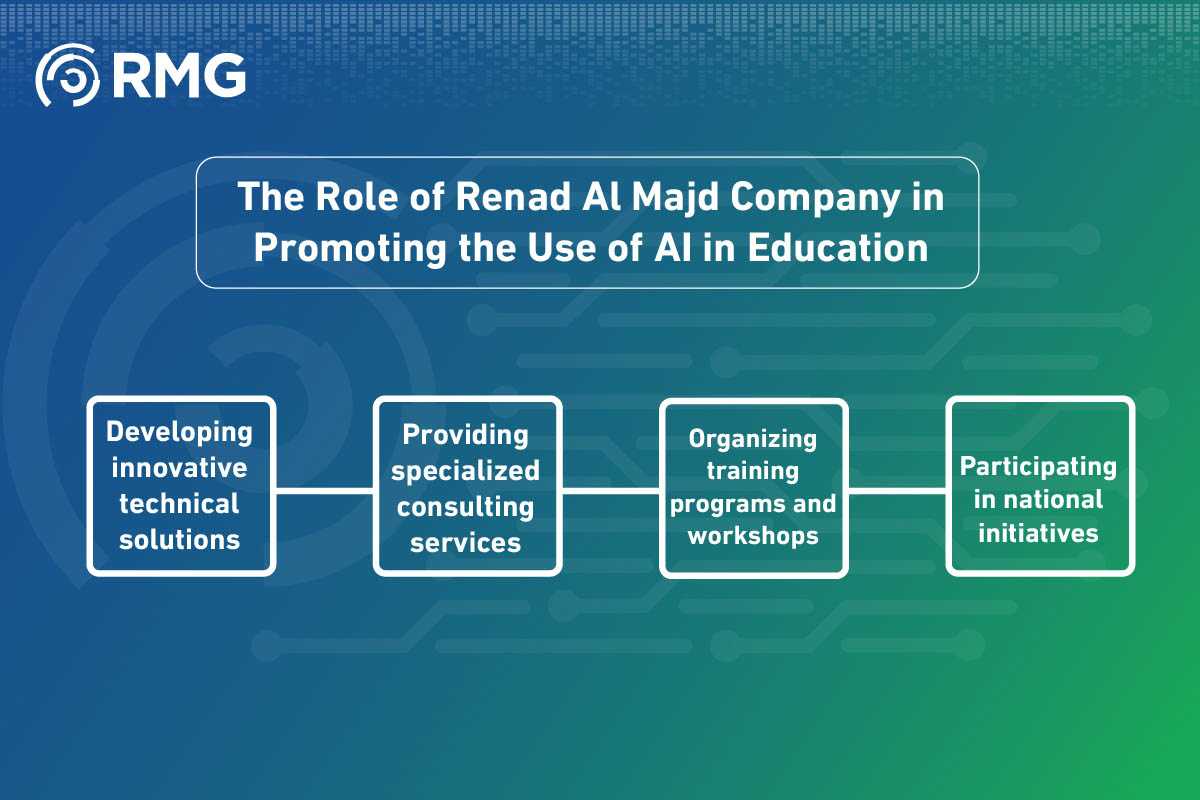
The Role of Renad Al Majd Company in Promoting the Use of AI in Education
Renad Al Majd (RMG) actively contributes to promoting the uses of artificial intelligence in education through several initiatives and programs:
- Developing innovative technical solutions:
- RMG develops smart solutions based on artificial intelligence, specifically designed to meet the needs of the education sector.
- These solutions include interactive educational platforms, intelligent learning management systems, and advanced data analysis tools.
- These solutions aim to improve the learning experience for students, provide effective tools for teachers, and raise the efficiency of educational institutions.
- Providing specialized consulting services:
- RMG provides specialized consulting services to educational institutions to help them effectively adopt artificial intelligence technologies.
- These services include analyzing needs, designing appropriate solutions, and providing the necessary technical support and training.
- These services help educational institutions understand the potential of artificial intelligence and utilize it to achieve their educational goals.
- Organizing training programs and workshops:
- RMG organizes training programs and specialized workshops in the field of artificial intelligence for education, targeting teachers, students, and those interested in technology.
- These programs aim to raise awareness of the importance of artificial intelligence in education and provide participants with the skills and knowledge necessary to use these technologies effectively.
- Participating in national initiatives:
- RMG actively participates in national initiatives aimed at promoting the use of artificial intelligence in various sectors, including the education sector.
- RMG cooperates with government agencies and educational institutions to develop and implement pioneering projects in the field of artificial intelligence for education.
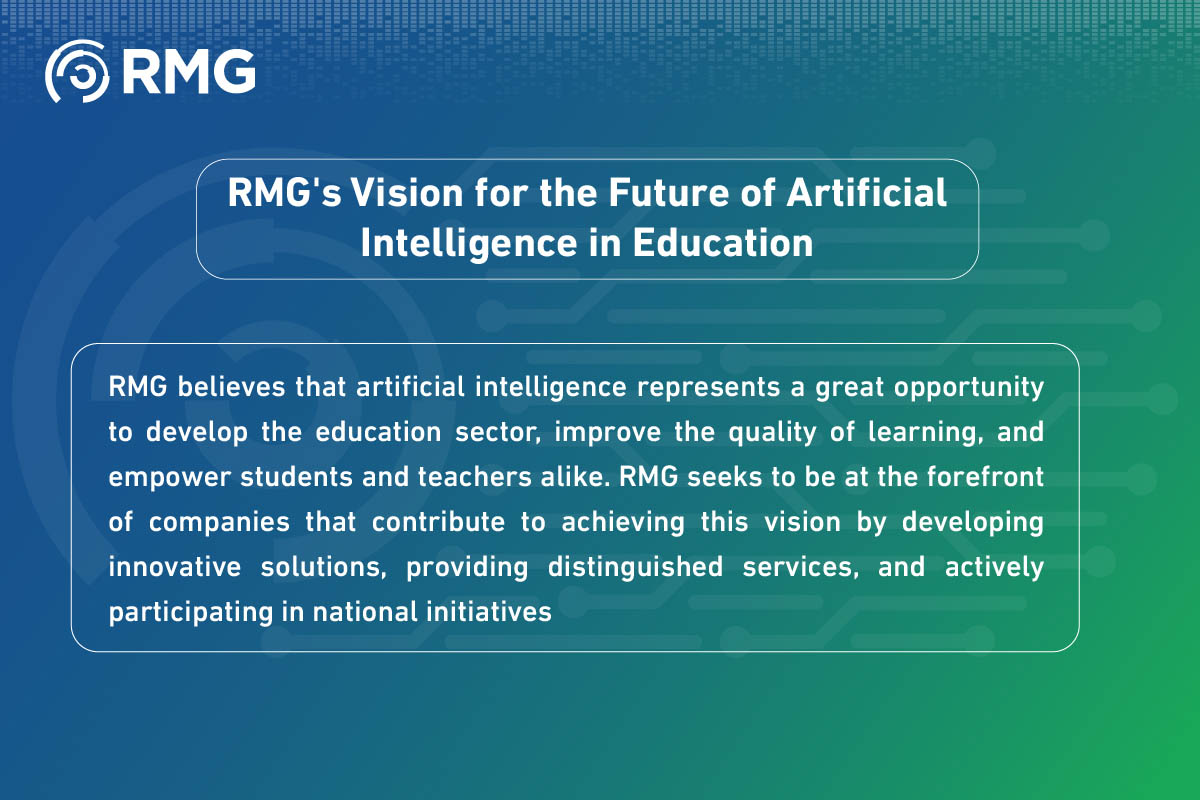
RMG’s Vision for the Future of Artificial Intelligence in Education
RMG believes that artificial intelligence represents a great opportunity to develop the education sector, improve the quality of learning, and empower students and teachers alike. RMG seeks to be at the forefront of companies that contribute to achieving this vision by developing innovative solutions, providing distinguished services, and actively participating in national initiatives.
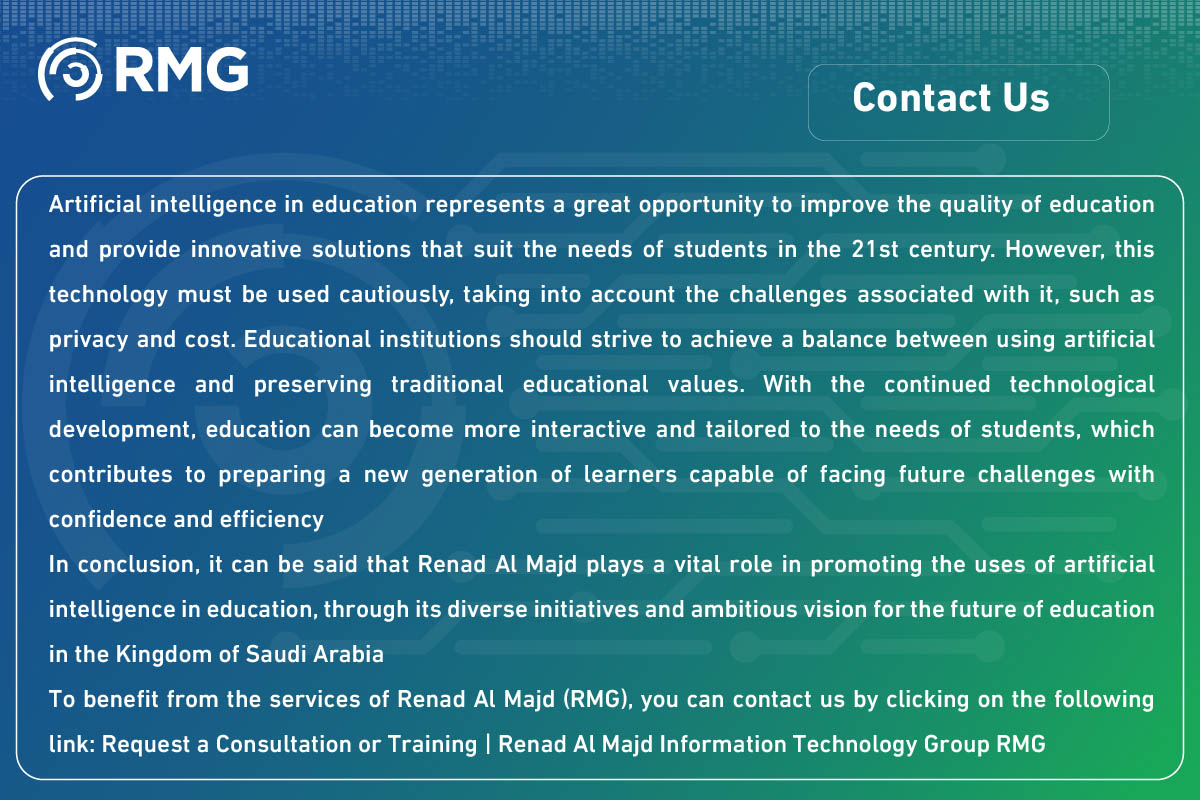
Contact Us
Artificial intelligence in education represents a great opportunity to improve the quality of education and provide innovative solutions that suit the needs of students in the 21st century. However, this technology must be used cautiously, taking into account the challenges associated with it, such as privacy and cost. Educational institutions should strive to achieve a balance between using artificial intelligence and preserving traditional educational values. With the continued technological development, education can become more interactive and tailored to the needs of students, which contributes to preparing a new generation of learners capable of facing future challenges with confidence and efficiency.
In conclusion, it can be said that Renad Al Majd plays a vital role in promoting the uses of artificial intelligence in education, through its diverse initiatives and ambitious vision for the future of education in the Kingdom of Saudi Arabia.
To benefit from the services of Renad Al Majd (RMG), you can contact us by clicking on the following form:














